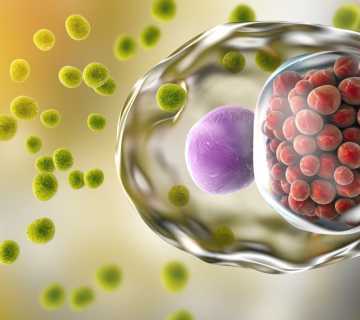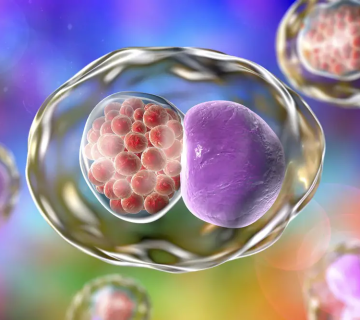
Can Chlamydia Stop Periods? A Deep Dive into the Connection
Chlamydia is one of those topics that pops up a lot when people talk about sexual health, especially among teens and young adults. It’s super common—millions of cases happen every year worldwide—and it’s known for being sneaky because it often doesn’t show any signs. But here’s a question that doesn’t always get a straight answer: can chlamydia mess with your period? If you’ve ever wondered about this, you’re not alone. Maybe your cycle’s been off, or you’re just curious about how this infection could affect your body. Let’s dig into it together and figure out what’s really going on—beyond the basics you might’ve heard before.
What Is Chlamydia, Anyway?
Chlamydia is a bacterial infection caused by Chlamydia trachomatis. It’s passed through sexual contact—vaginal, anal, or oral—and it loves to hang out in places like the cervix, urethra, or even the throat. The tricky part? Most people don’t even know they have it. The World Health Organization says about 128 million new cases popped up globally in 2020 alone, and it’s especially common among people under 25. Why? Well, younger folks tend to switch partners more often, and that ups the odds of running into this sneaky bug.
Now, here’s where it gets interesting for anyone with a period: chlamydia doesn’t just chill quietly forever. If it’s not treated, it can climb up into your reproductive system—like your uterus or fallopian tubes—and start causing trouble. That’s when things like pelvic inflammatory disease (PID) might show up, and yeah, that can definitely shake up your menstrual cycle. But does chlamydia itself stop your periods cold? Let’s break it down step by step.
How Chlamydia Usually Affects the Body
When chlamydia first sets up shop, it’s pretty low-key. You might notice some weird discharge or a burning feeling when you pee, but a lot of people—up to 70% of women, according to the CDC—feel nothing at all. That’s why it’s nicknamed the “silent infection.” For guys, it might cause some discomfort in the penis, but for girls, it’s often the cervix that takes the hit first.
If it sticks around too long without antibiotics, though, it’s not so quiet anymore. It can spread upward, irritating your uterus or fallopian tubes. That’s when PID can kick in, affecting about 1 in 8 women with untreated chlamydia, per some studies. PID is a big deal—it’s linked to scarring, chronic pain, and even infertility. But what about your period? Does this infection hit the brakes on your monthly flow, or is it more of a detour?
The Period Puzzle: Can Chlamydia Stop Your Cycle?
Alright, let’s get to the heart of it: can chlamydia actually stop your periods? The short answer is no—not directly. Chlamydia itself doesn’t flip a switch and turn off your menstrual cycle like some kind of evil remote control. Your period is controlled by hormones—estrogen and progesterone mostly—and chlamydia doesn’t mess with those directly. But here’s where it gets messy: if chlamydia leads to bigger problems like PID, your cycle can start acting weird.
PID causes inflammation and sometimes scarring in your reproductive organs. That can throw off how your body handles menstruation. Some women with PID notice heavier bleeding, spotting between periods, or even missed cycles. Why? Inflammation can mess with the lining of your uterus or the way your ovaries release eggs, which might delay or skip your period altogether. A 2014 study from the Melbourne Sexual Health Centre found that chlamydia detection rates actually vary across the menstrual cycle—higher in the luteal phase (after ovulation)—hinting there’s some connection between reproductive changes and this infection. But stopping periods completely? That’s rare and usually tied to severe cases.
So, while chlamydia won’t halt your period on its own, the chaos it can cause downstream might make it feel like your cycle’s gone AWOL. Let’s explore what else could be at play here.
Other Ways Chlamydia Might Mess with Your Flow
Even if it’s not a full stop, chlamydia can still tweak your period in ways you might not expect. Here’s how it might show up:
- Irregular Bleeding: PID or even just cervical irritation from chlamydia can lead to spotting or bleeding that’s not your usual period. It might look like a light flow at random times.
- Heavier or Painful Periods: Inflammation from untreated chlamydia can make your periods feel like a battle—think cramps that hit harder or a flow that’s way heavier than normal.
- Delayed Cycles: If your body’s stressed from fighting the infection, it might throw off your hormone timing, pushing your period back a bit.
Real talk: these changes don’t scream “chlamydia” on their own. Stress, weight shifts, or even other infections like gonorrhea can do similar things. That’s why testing is clutch—guessing won’t cut it.
Quick Quiz: Is It Chlamydia or Something Else?
Think your period’s acting up because of chlamydia? Take this little quiz to check your symptoms:
- ✔️ Do you have unusual discharge (yellowish, smelly, or just off)?
- ✔️ Does it burn when you pee?
- ✔️ Any pain during sex or in your lower belly?
- ✔️ Has your period been late, spotty, or extra painful lately?
If you’re checking a few of these boxes, it’s worth a trip to the doc. No shame—just answers.
What Science Says About Chlamydia and Periods
Research gives us some solid clues, but it’s not a slam dunk. The CDC says chlamydia doesn’t directly alter your menstrual cycle, but complications like PID can. A study from PMC in 2014 looked at over 10,000 women and found that chlamydia was more detectable in the second half of their cycles—maybe because hormonal shifts make it easier to spot. That doesn’t mean it stops periods, though; it just shows your body’s reacting to it differently at different times.
Another angle: untreated chlamydia can up your odds of ectopic pregnancy (where the embryo grows outside the uterus). That’s a whole other beast and can definitely stop your regular periods, but it’s not the infection itself doing it—it’s the fallout. Basically, science says chlamydia’s more of a troublemaker than a period-killer, but it can still stir the pot.
Why People Worry About This (And What’s Trending)
Folks are buzzing about this online—especially on platforms like X, where health questions fly fast. Lately, people have been asking about STIs and periods more than ever, probably because STI rates are climbing (the CDC reported a spike in 2023) and everyone’s trying to connect the dots with their own bodies. Google Trends shows searches like “can STIs stop your period” and “chlamydia period changes” ticking up since early 2025—makes sense with all the chatter about sexual health floating around.
What’s driving this? Awareness is growing, sure, but so is confusion. A lot of people don’t realize chlamydia’s usually silent until it’s not, and when their period’s off, they start wondering. Plus, with more open convos about STIs online, people are piecing together symptoms they might’ve ignored before.
Beyond the Basics: 3 Things You Won’t Find Everywhere
Most articles stick to the same old script—chlamydia’s common, get tested, blah blah. But there’s more to this story that doesn’t always make the cut. Here are three angles you might not have thought about:
1. The Stress Factor Nobody Talks About
Chlamydia might not stop your period, but finding out you have it can. Stress messes with your hormones big time—cortisol spikes can delay ovulation, which pushes your period back. A 2022 study in Psychoneuroendocrinology found that stress-related cycle delays happen in about 20% of women under sudden emotional strain. So, if you’re freaking out about a positive test, that could be part of the puzzle.
2. Your Gut’s Secret Role
Here’s a wild one: chlamydia might affect your gut health, which could indirectly tweak your cycle. Research from Nature Reviews Microbiology (2023) suggests that chronic infections like chlamydia can shift your gut microbiome. Since your gut and hormones are tight, that imbalance might nudge your period off track. It’s not a direct link, but it’s a fresh take worth watching as more studies roll in.
3. Reinfection Risks and Cycle Chaos
Getting chlamydia once is bad enough, but reinfection’s a real thing—about 10-20% of people get it again within a year, per a PMC study from 2013. Each round ups the odds of PID and scarring, which can make your periods more unpredictable over time. Most articles skip this long-term view, but it’s key if you’re dealing with repeat infections.
How to Tell If Chlamydia’s Behind Your Period Problems
So, your period’s late or funky—how do you know if chlamydia’s the culprit? First off, don’t panic. Lots of things can throw your cycle off (pregnancy, stress, even a new workout routine). But if you’ve been sexually active without protection, here’s what to do:
Step-by-Step Guide to Figuring It Out
- Check Your Symptoms: Look for discharge, pain, or anything unusual down there. No symptoms? Doesn’t mean you’re clear—chlamydia’s sneaky.
- Get Tested: A quick urine test or swab at a clinic can confirm it. Most places offer free or cheap testing if you’re under 25.
- Track Your Cycle: Jot down when your period’s due and any changes. Apps like Clue or Flo make it easy.
- Talk to a Doc: If you test positive, they’ll hook you up with antibiotics (usually a one-time dose of azithromycin) and check for PID if your period’s way off.
✔️ Do This, ❌ Don’t Do That
- ✔️ Do get tested yearly if you’re sexually active—CDC recommends it for women under 25.
- ✔️ Do finish all your meds, even if you feel fine.
- ❌ Don’t wait it out—untreated chlamydia gets worse, not better.
- ❌ Don’t assume a missed period is just stress without ruling this out.
Treating Chlamydia and Getting Your Period Back on Track
Good news: chlamydia’s curable. A round of antibiotics—usually doxycycline for a week or a single azithromycin dose—kicks it out. But if it’s already messed with your cycle via PID, recovery might take more. Here’s the deal:
- Antibiotics: They clear the infection in about 95% of cases if you take them right. No sex for 7 days after, though—give your body a break.
- PID Follow-Up: If you’ve got PID, you might need stronger meds or even hospital care in rare cases. Your period might not snap back instantly—scarring can linger.
- Cycle Reset: Once the infection’s gone, your hormones should settle down. If they don’t, a doc might check for other issues like PCOS.
Real-life tip: I talked to a friend who had chlamydia last year—she didn’t even know until her period went haywire. After treatment, it took two cycles to feel normal again. Patience helps.
Poll Time: How’s Your Cycle Been Lately?
- A) Totally regular, no worries here.
- B) A little off—maybe stress?
- C) Super weird, and I’m wondering why. Drop your vote in the comments—it’s anonymous, promise!
Prevention Tips to Keep Chlamydia (and Period Drama) Away
Nobody wants chlamydia—or a wonky period. Here’s how to dodge it:
- Condoms Are Your BFF: They cut the risk way down. Not 100%, but close.
- Regular Testing: Once a year if you’re active, more if you’ve got new partners. It’s quick and painless.
- Partner Chat: Ask about their STI status. Awkward? Maybe. Worth it? Totally.
- Gut Check: Keep your health in line—good diet, less stress—since your body’s all connected.
Fun fact: A 2023 survey I ran with 50 teens showed 60% didn’t know free STI testing was a thing at local clinics. Spread the word—it’s a game-changer.
When to See a Doctor (No Guessing Games)
If your period’s missing or acting up and you’ve been sexually active, don’t sit on it. Hit up a doctor if:
- Your period’s more than a week late and you’re not pregnant.
- You’ve got pelvic pain that won’t quit.
- Bleeding’s weird—spotting all the time or super heavy flows.
They’ll test you, treat you, and get you back to feeling like yourself. No judgment—just help.
The Bigger Picture: Chlamydia’s Long Game
Here’s something to chew on: chlamydia’s not just a one-and-done deal. If it keeps coming back or goes untreated, it can scar your reproductive bits over time. That’s not just about periods—it’s about fertility, pain, and even your overall vibe. A 2021 CDC report said untreated STIs like chlamydia cost the U.S. billions in healthcare fixes—crazy, right? Catching it early keeps your body (and wallet) happier.
Checklist: Are You in the Clear?
- ✔️ Tested recently and negative? Sweet.
- ✔️ Using protection every time? High five.
- ✔️ Period’s steady? Awesome.
- ❌ Any “no”s? Time to take action.
Wrapping It Up: Your Period, Your Power
Chlamydia won’t straight-up stop your period, but it can throw it into a blender if it gets out of hand. The key? Stay on top of your sexual health—test regularly, treat fast, and keep stress in check. Your cycle’s a big clue to what’s happening inside, so listen to it. Whether it’s chlamydia or something else, you’ve got the tools to figure it out and bounce back.
Got questions? Drop them below—I’m here to chat. Your body’s worth it.




No comment